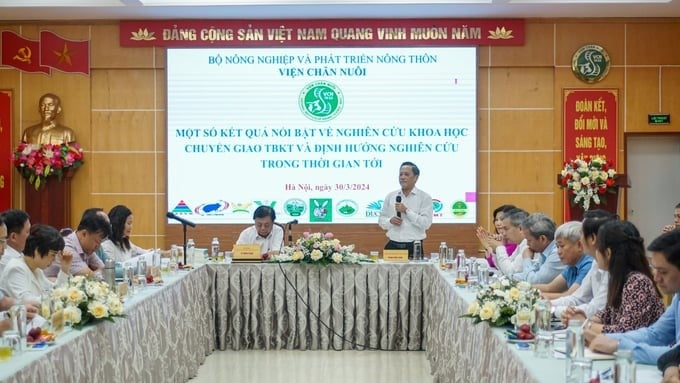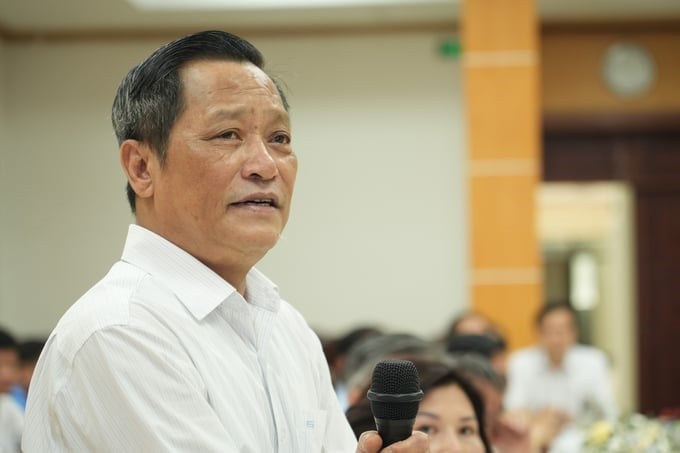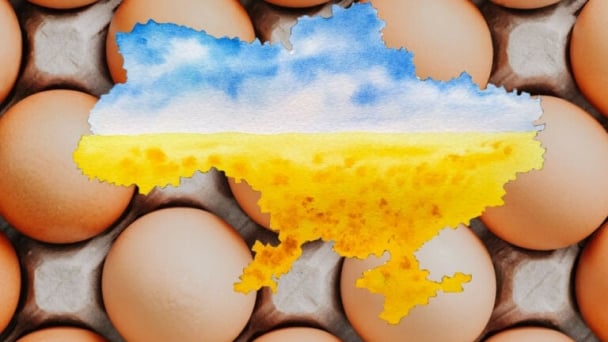May 20, 2025 | 18:48 GMT +7
May 20, 2025 | 18:48 GMT +7
Hotline: 0913.378.918
May 20, 2025 | 18:48 GMT +7
Hotline: 0913.378.918
In the past 5 years, Vietnam's livestock industry has achieved a high average growth rate (4.5–6%/year), of which total live meat output of all types has grown by an average of 2.7%/year; egg output increased by 7.1%/year; and raw fresh milk output increased by 4.5%/year. In 2023, the production value of the livestock industry is estimated to grow by 5.72%, contributing 26% to agricultural GDP.
In addition to the achievements of 2023, Minister of Agriculture and Rural Development Le Minh Hoan wishes that in the coming time, the National Institute of Animal Science will research the field of animal welfare because a sustainable livestock industry cannot lack animal welfare.

Minister of Agriculture and Rural Development Le Minh Hoan worked with the National Institute of Animal Science on March 30. Photo: Hung Khang.
The Minister cited that in European countries, since 2018, people have begun to care about animal welfare by not raising animals in cages. Ensuring animal welfare will be associated with biosecurity and reducing antibiotics in livestock farming. Those will be solutions for livestock products to be eligible for export to many markets.
According to Minister Le Minh Hoan, animal welfare is simply understood as treating animals well so that they are in the best physical and mental state, avoiding unnecessary pain, whether they are animals raised for food, production tools, or pets.

Minister Le Minh Hoan said that consumers are currently very interested in how livestock are cared for. Photo: Hung Khang.
"The increasing incidence of cancer makes us ask the question of whether the food people eat is really good. Therefore, before buying animal meat products, consumers are also interested in how the animals live in the cage," said Minister Le Minh Hoan.
In order for products from cattle and poultry to be free of antibiotic residues and growth substances, instead of letting livestock (laying hens, sows) "liberate" in cages, it is necessary to create conditions for them to live in a free environment according to their behavior. When livestock are not stressed, they will produce more productive and better-quality meat and eggs.
At the conference, Ms. Ngo Thi Kim Cuc, Deputy Director of the National Institute of Animal Science (Ministry of Agriculture and Rural Development), pointed out the limitations of current breed research. Specifically, breed programs are not long-term, leading to a limited number of breeds brought to the market. Therefore, in the coming time, funding for breed programs needs to be extended to ensure the potential of breed programs is fully promoted.
In Vietnam, household farming is still quite popular. The average scale of farmer households is 3–4 pigs/household, accounting for 65% of the total pig herd and more than half of meat output for the market. Chickens raised in farmer households account for 70% of the total herd and 60% of meat output. Currently, the number of households raising chickens is 6.5 million. Nearly 100% of large livestock herds (buffaloes and cows) are raised in farmer households.
Therefore, the Party and State have had many policies to develop household farming towards modernity. In 2014, the Prime Minister issued Decision No. 50/2014/QD-TTg on policies to support improving the efficiency of household farming for the 2015–2020 period. These policies have had positive impacts and brought clear economic efficiency, helping to stabilize people's livelihoods, improving productivity and quality of livestock herds, and increasing the income of livestock households by 5–10%.

Mr. Pham Cong Thieu, Director of the National Institute of Animal Science, spoke at the conference. Photo: Hung Khang.
At the working session with Minister Le Minh Hoan, Mr. Pham Cong Thieu, Director of the National Institute of Animal Science, said that in the coming time, the Institute will continue to pay more attention to the research and development of household farming, especially in remote and mountainous areas. Because household farming by ethnic minorities currently accounts for 13%, promoting research on household farming will help develop economics for the people here.
To do that, the National Institute of Animal Science has strengthened cooperation with agricultural and forestry universities across the country, taking advantage of all resources and intelligence so that the work of researching and developing household farming is highly effective and has practical application.
Besides, to limit the risks brought by household farming, such as low productivity, high disease risk, poor veterinary hygiene and safety, etc., in the coming time, the National Institute of Animal Science plans to develop research and application of new technology to accelerate genetic progress and increase productivity, quality, and health of livestock.
In addition, the National Institute of Animal Science will also increase learning exchanges from countries with developed agriculture, such as the US, Australia, Japan, etc., aiming for joint venture cooperation and technology transfer from the above countries.
Translated by Huyen Vu Thu

(VAN) Oliyar, a prominent Ukrainian oil and fat manufacturer, has revealed plans to build a farm for 2.3 million laying hens in the Lviv region. The additional production quantities promise to change the competitive landscape of the egg market of the Eastern Europe region.

(VAN) On May 15, Ministry of Agriculture and Environment of Vietnam hosted the 'Connecting Vietnam - Germany agricultural, forestry and fishery trade' seminar in Berlin, Germany.

(VAN) In the face of counterfeit and imitation products, Khanh Hoa Salanganes Nest Company hopes for the prompt completion of the legal framework, strict enforcement against violations, and protection of the bird’s nest brand.

(VAN) Japan's efforts to lower the price of rice through the release of its stockpile may finally be making some progress, albeit at a snail's pace.

(VAN) U.S. tariffs are not only a 'shock', but also an opportunity for Vietnamese businesses to renew their mindset toward comprehensive development.

(VAN) As Bac Giang lychee enters the harvest season, Minister Do Duc Duy expects that the fruit will contribute greatly to agricultural exports due to standardized production and deep processing.

(VAN) Consumers have shown a preference for free-range eggs, but those farming systems are more vulnerable to biosecurity risks like bird flu.